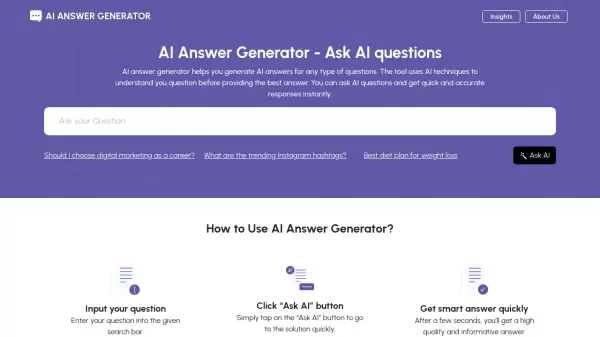What is answer.ai?
Answer.AI operates as a distinct type of Artificial Intelligence (AI) research and development laboratory. Its primary mission involves transforming fundamental research advancements into tangible, practical products and tools suitable for end-users. The lab focuses on bridging the gap between theoretical breakthroughs and real-world applicability, emphasizing the creation of useful AI-driven solutions.
The organization actively contributes to the open-source community by releasing various tools and models. Key areas of focus include the development of advanced language models like ModernBERT, tools aimed at developers such as FastHTML for web applications and ShellSage for command-line assistance, libraries like gpu.cpp for GPU computing, and research into optimizing AI efficiency through projects like FSDP QDoRA for model fine-tuning and Cold Compress for KV-cache compression. Answer.AI also shares insights and findings through technical articles and research papers.
Features
- ModernBERT: Development of state-of-the-art encoder-only language models.
- ShellSage: An AI assistant designed to help users with shell scripting.
- rerankers: A Python library providing a unified interface for various re-ranking methods in retrieval pipelines.
- WebGPU Puzzles: An interactive, browser-based platform for learning GPU programming using WebGPU.
- answerai-colbert-small: A compact and efficient ColBERT model for information retrieval tasks.
- FastHTML: A Python library enabling the creation of modern, interactive web applications purely in Python.
- JaColBERTv2.5: An optimized multi-vector retrieval model specifically for the Japanese language.
- Cold Compress: A toolkit for developing and benchmarking KV cache compression techniques.
- gpu.cpp: A lightweight, open-source C++ library for portable GPU computation.
- Claudette: A tool designed to enhance interactions with the Claude 3.5 Sonnet language model.
- FSDP QDoRA: A memory-efficient method for fine-tuning large language models (like 70B parameter models) on consumer hardware.
Use Cases
- Developing and deploying state-of-the-art AI models.
- Building efficient information retrieval systems.
- Creating modern web applications using Python.
- Optimizing the training and deployment of large language models.
- Learning and implementing GPU programming techniques.
- Receiving AI-powered assistance for shell scripting and command-line tasks.
- Contributing to and utilizing open-source AI tools and libraries.
- Researching advancements in AI model efficiency and performance.
Related Queries
Helpful for people in the following professions
answer.ai Uptime Monitor
Average Uptime
100%
Average Response Time
116.5 ms










